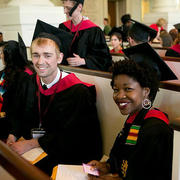
For the second year in a row, Harvard has earned the #1 world ranking for the study of divinity, theology, and religion from the prestigious QS World University Rankings.
(Find out about degree programs, financial aid, and how to apply to HDS or make a gift to support world-class religious scholarship and education.)
QS, which aims to help prospective students identify the world’s leading schools in their field of interest, named Harvard #1 out of 100 Institutions worldwide. The firm uses a wide-ranging methodology for its rankings, including a school’s academic reputation, employer reputation, academic citations per paper by faculty, and H-Index citations (measuring productivity and the impact of published work by faculty).
“Together with our partners across the University, the Divinity School’s preeminent place among institutions for the study of global religion is a tribute to the efforts of our remarkable faculty and staff—and to the outstanding students we are fortunate to attract each year,” says HDS Dean David N. Hempton. “Perhaps the most gratifying aspect of this news is that it demonstrates that excellence in critical scholarship in religion and excellence in theological and professional education are not mutually exclusive. In fact, they inform and augment one another.”
Harvard was followed in the rankings by Oxford, Durham, and Cambridge in the UK. Vrije Universiteit Amsterdam claimed the number five slot.
Founded in 1816, and one of the oldest of Harvard University's professional schools, Harvard Divinity School has a long history of fostering scholarship and critical thinking, as well as supporting service and ministry.
The faculty, researchers, and counselors at HDS are among the most distinguished scholars of religious practice and belief in the world. Students at HDS learn from specialists in the Christian, Unitarian Universalist, Jewish, Buddhist, Hindu, Islamic, African, Mesoamerican, and Latino/a traditions. The student body represents approximately 30 religious traditions and denominations, and reflects an equally broad spectrum in their academic interests and backgrounds, age, gender, nationalities and ethnicities, cultures and traditions, and professional and life goals.
HDS graduates engage in a wide variety of professions. They continue in academic careers and go on to educate future scholars and teachers of religion and theology; they become ministers and leaders in their own religious traditions; they work in public service and with governmental, nongovernmental, and social organizations, in nonprofits and in business, in the arts, in health care, and in other professions.
—by Gordon Hardy
